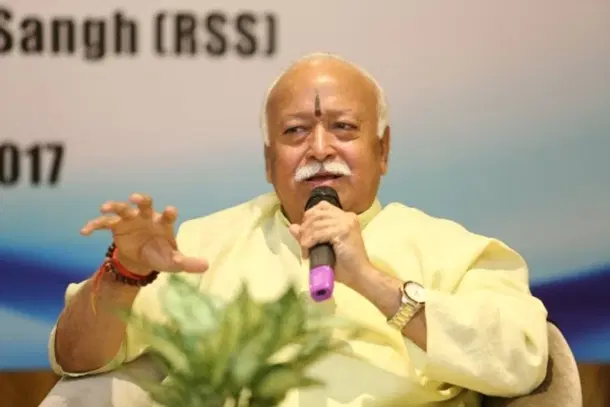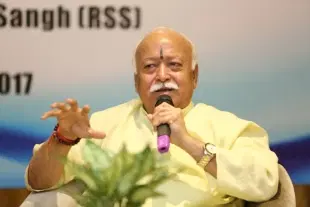Ideas
Five Remedies For Seven Sins: Why It Was Natural For Mohan Bhagwat To Invoke Mahatma Gandhi
Adithya Reddy
Aug 31, 2025, 09:10 AM | Updated 09:13 AM IST
Save & read from anywhere!
Bookmark stories for easy access on any device or the Swarajya app.


RSS Chief Dr Mohan Bhagwat just delivered a three-day lecture series as part of the organisation’s centenary year celebrations. As was expected, the focus in mainstream media while reporting the speeches was on some specific political or social issues, especially the most controversial ones.
A large number of the questions posed to him by the audience, which comprised eminent people, on the third and last day also related to issues such as the RSS-BJP relations and Hindu-Muslim unity. Dr Bhagwat spoke on all these issues and more with great clarity.
But to find the true significance of his message, which has been the RSS’s message from the beginning, one has to be careful to distinguish between two kinds of issues. The difference is between factors that determine or help understand the very nature of our social life and issues that call for the adoption of a moral standpoint on policy.
In a slightly different context, political philosopher Charles Taylor calls the former “ontological issues” and the latter “advocacy issues”. The bewilderment that people face when the RSS says it did not or does not compel its workers to join a particular social or political movement is primarily a result of the failure to understand this distinction.
Like Dr Bhagwat mentioned, it was the historic truth of India’s servitude in foreign hands for more than a millennium that set the Sangh’s founder Dr Hedgewar thinking on solutions. The solution that he arrived at was not specific to the issue of how to handle foreign invaders. It was a solution that aimed at restoring a way of life that was practised from times immemorial in our nation but had lost its potency for various reasons.
It was about building an organised society of individuals who put the needs of such society above their personal needs. It challenged a most fundamental conception about man in Western thought, as essentially a selfish being with an instrumental relation to society. Much of our own misunderstanding about the RSS comes from the influence of this Western thought process.
It is in this context that one has to understand Dr Bhagwat’s mention of Mahatma Gandhi’s seven ‘social sins’. Any contemporary media person, intellectual or even the most passionate activist will either find such talk uninteresting or call it just moral grandstanding with no practical value.
To talk of the sins of “wealth without work” and “commerce without morality” in the era of crony capitalism; or “religion without sacrifice” and “politics without principle” when large sums are donated for religious purposes from ill-gotten wealth; or “science without humanity” in the times of ‘Big Pharma’ will sound like making a laughing stock of oneself. But that is the path the RSS has always followed.
A Swayamsevak trained in the Shakha system learns to shed selfish pursuit of personal ends no matter what field he chooses to work in; education, politics, science or religion. When the RSS says it wants to become sarvasparshi or sarvavyapi or engage with everyone irrespective of their personal views, it is only to try and take these values to the larger society.
This is not going to be an easy task, especially when the focus is only on divisive issues and politics. Like Dr Bhagwat mentioned in the context of environmental protection, a car that is travelling at high speed will topple if it applies brakes suddenly. Our society has gone too far in the direction of individualism and materialism, so turning back has to happen slowly and steadily.
More importantly, change has to come from within and from the ground up for it to be durable. Dr Bhagwat’s statement that institutional change has to follow social change goes to the heart of the difference between the Western and Bharatiya approaches to social reform.
The five pointers for change or pancha-parivartan that the RSS has adopted as areas of work for its Swayamsevaks in its 100th year are examples of this slow and steady approach to social change. The five areas are social harmony, environmental protection, nurturing family values, self-realisation or self-dependence, and following civic duties.
For want of space, let us briefly discuss the first area alone. Seven decades after Pandit Nehru predicted that the “conditions of modern life” would expedite the end of casteism, we are seeing a renewed spirit of hatred among caste groups in recent times. By the “conditions of modern life” Nehru was obviously referring to economic progress and technological development.
Clearly, these developments have not helped in ensuring social solidarity. On the contrary, they have made individualism the centrepiece of social life. Dr Bhagwat has outlined the only way the problem of social disharmony can be addressed in the traditional Bharatiya approach. It is basically to build personal friendships at the local level with Hindus from all social backgrounds.
As simple as this sounds, there can be nothing tougher than convincing a busy middle-class employee or professional to make a conscious effort to make any kind of friends in the neighbourhood, let alone friends from different backgrounds. There will be more immediate efforts such as reaching out to elders and leaders in caste groups and creating awareness about opening temples, water sources and crematoriums for all castes. But the RSS’s focus is on ensuring change at the most personal level so that the society shines through the individual.
All the other four areas of change are also linked to this basic mission. Dr Bhagwat highlighted how the RSS’s mission has always been compatible with the ideas of the greatest thinkers of our nation. The example cited by him of Rabindranath Tagore’s 1904 essay Swadeshi Samaj was meant to show this continuity in thought.
In the essay Tagore says that for India’s unity to not be “doomed to repeated futility” it must be a “realisation of India’s essential oneness from within.” So he says, “It is always incumbent on us to inquire what is the true way of India.” According to Tagore, “To establish a personal relationship between man and man was always India’s main endeavour. Our relationships extended to the most distant connections, continued unrelaxed with children even when grown up and included neighbours and villagers irrespective of race or caste. Whomsoever we came into contact with we drew into the circle of relationship. So we never got into the habit of looking on man as a machine, or a tool, for the furtherance of some interest.”
This “Indian way” has always been the RSS’s way. Dr Bhagwat has given a call for all Bharatiyas to join this way. It is time we responded.politics.
Like Dr. Bhagwat mentioned in the context of environmental protection, a car that is travelling at high speed will topple if it applies breaks suddenly. Our society has gone too far in the direction of individualism and materialism that turning back has to happen slowly and steadily. More importantly change has to come from within and ground-up for it to be durable. Dr. Bhagwat’s statement that institutional change has to follow social change goes to the heart of the difference between the western and Bharatiya approaches to social reform.
The five pointers for change or ‘pancha-parivartan’ that the RSS has adopted as areas of work for its Swayamsevaks in its 100th year are examples of this slow and steady approach to social change. The five areas are social harmony, environment protection, nurturing family values, self-realisation/ self-dependence and following civic duties. For want of space let us briefly discuss the first area alone. Seven decades after Pandit Nehru predicted that the “conditions of modern life” will expedite the end of casteism we are seeing a renewed spirit of hatred among caste groups in recent times. By the ‘conditions of modern life’ Nehru was obviously referring to economic progress and technological development. Clearly, these developments have not helped in ensuring social solidarity. On the contrary they have made individualism the centrepiece of social life. Dr. Bhagwat has outlined the only way the problem of social disharmony can be addressed in the traditional Bharatiya approach. It is basically to build personal friendships at the local level with Hindus from all social backgrounds. As simple as this sounds, there can be nothing tougher than convincing a busy middle-class employee or professional to make a conscious effort to make any kind of friends in the neighbourhood leave alone friends from different backgrounds. There will be more immediate efforts like reaching out to elders and leaders in caste groups and creating awareness about opening temples, water sources and crematoriums for all castes. But the RSS’s focus is on ensuring change at the most personal level so that the society shines through the individual. All the other four areas of change are also linked to this basic mission.
Dr. Bhagwat highlighted how the RSS’s mission has always been compatible with the ideas of the greatest thinkers of our nation. The example cited by him of Rabindranath Tagore’s1904 essay “Swadeshi Samaj” was meant to show this continuity in thought. In the essay Tagore says for India’s unity to not be “doomed to repeated futility” it must be a “realisation of India’s essential oneness form within.” So he says “it is always incumbent on us to inquire what is the true way of India.” According Tagore- “To establish a personal relationship between man and man was always India's main endeavour. Our relationships extended to the most distant connections, continued unrelaxed with children even when grown up and included neighbours and villagers irrespective of race or caste….Whomsoever we came into contact with we drew into the circle of relationship. So we never got into the habit of looking on man as a machine, or a tool, for the furtherance of some interest.” This ‘Indian way’ has always been the RSS’s way. Dr. Bhagwat has given a call for all Bharatiyas to join this way. It is time we responded.
Adithya Reddy is a Chennai-based lawyer.





